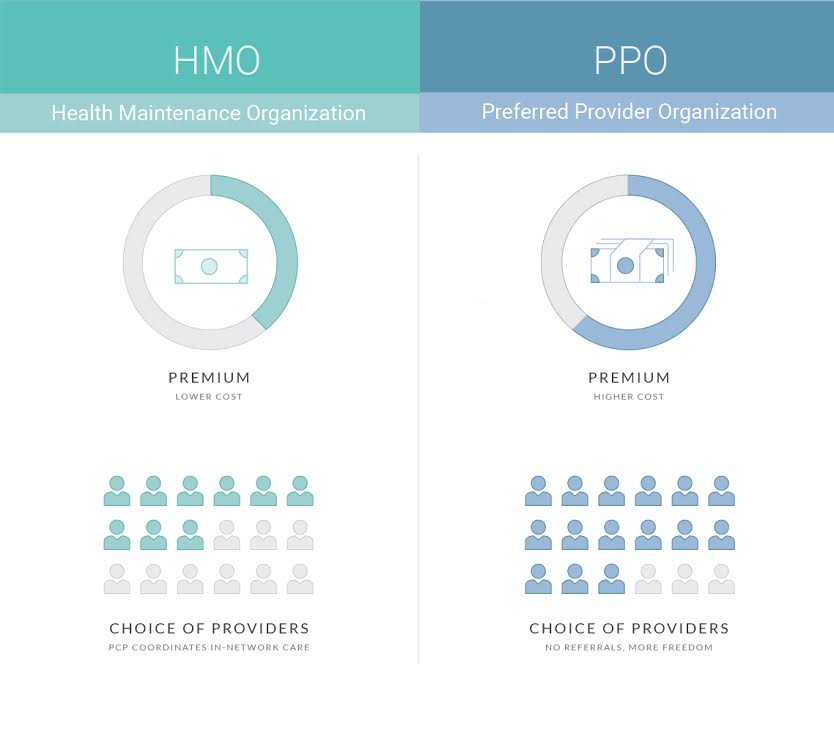HMO vs. PPO – What you need to know.
Health Maintenance Organization (HMO) vs. Preferred Provider Organization (PPO)
Oh, health insurance… So much to consider, down to even the type of health plan.
So, which is right for you? In choosing your next health insurance plan, knowing your options will lead you to strike the right balance between coverage and affordability that’s right for you. In this article, we dive into the major differences between HMO and PPO, in addition to other options and things to watch out for.

From KBI
HMO
Health Maintenance Organizations or Health Maintenance Plans (HMPs) are in-network coverage plans designed to be robust and affordable. If you don’t mind being ‘boxed-in’ to the HMO’s network of healthcare providers, then it can save you money versus conventional PPOs. This type of plan is best for someone who does not travel much or requires out-of-network care. To be clear, with an HMP, you can only see providers that are in-network. Exceptions exist, however, in the event of an emergency, out-of-network providers may be covered. Typically, you will be expected to pay $30 copays per visit and enjoy lower premiums than other types of coverage.
HMO plans are generally less expensive than PPO plans, with lower monthly payments, making them ideal if your favorite doctors are already in the network, or if you receive most of your care close to home. CareFirst
PPO
Preferred Provider Organizations will allow you to see any in-network healthcare provider with a copay, and in some cases free of copay. Unlike HMPs, these plans; called Preferred Provider Plans (PPPs), allow you to see out-of-network providers (with a referral and copay). This type of health coverage plan is the most conventional, but the flexibility of seeing out-of-network providers comes at a higher price than other plan types.
Like an HMO, a Preferred Provider Organization is a network of doctors, hospitals and health care providers who agree to provide care at a certain rate. Unlike an HMO, you are not limited to providers who are in-network, though your copay or out-of-pocket cost for out-of-network visits may be higher than for in-network providers. CareFirst

From Workest by Zenifits
MMP
The third type of health coverage; Major Medical Plans / Indemnity Plans, covers hospital and medical expenses and sometimes preventative care and office visits. Typically, these plans cover a percentage of your covered costs. For example, the provider would cover 80% of the costs and the policyholder the remaining 20%. This type of coverage plan isn’t for everybody, however. A short hospital stay can end up costing you a premium’s worth in cost-splitting.
Medicare Options
Did you know? Medicare has PPPs and MMPs available, too. These plans function much the same within the Medicare framework and can either save you money or increase network flexibility either way.
Things to Consider
Things to consider before switching health plans.
Do you need to lower your monthly payment? HMO might be best for you, then.
Do you travel frequently, or mostly stay home? PPO is likely best for you in this case.
Is network flexibility most important, and cost not a consideration? If you wish to maximize the providers you can see, and don’t mind skirting the bill after cost-sharing, an MMP may be best for you.
FAQ – HMO vs. PPO
Frequently Asked Questions
Chart provided by Humana
|
Question
|
HMO health maintenance organization
|
PPO preferred provider organization
|
|---|---|---|
|
How much will this plan cost?
|
Lower cost
HMO plans typically have lower monthly premiums. You can also expect to pay less out of pocket. |
Higher cost
PPOs tend to have higher monthly premiums in exchange for the flexibility to use providers both in and out of network without a referral. Out-of-pocket medical costs can also run higher with a PPO plan. |
|
Do I have to use a primary care physician (PCP)?
|
Yes
With most HMO plans, all of your healthcare services are coordinated by your designated PCP. |
No
PPO plans do not require referrals for any services. |
|
Do I have to get referrals to use another doctor?
|
Yes
With an HMO, you must first schedule an appointment with your PCP and they will provide a referral to an in-network specialist. |
No
PPO plans do not require referrals for any services. |
|
If I have a doctor or a specialist who is out of network, will I still be able to see him or her and have the costs covered?
|
No
HMOs don’t offer coverage for care from out-of-network healthcare providers. The only exception is for true medical emergencies. |
Yes
With a PPO, you have the flexibility to visit providers outside of your network. However, visiting an out-of-network provider will include a higher fee and a separate deductible. |
|
Will I need to file claims?
|
No
Since HMOs only allow you to visit in-network providers, it’s likely you’ll never have to file a claim. This is because your insurance company pays the provider directly. |
Yes
In some cases, you will have to pay a doctor for services directly and then file a claim to get reimbursed. This is most common when you seek services from out-of-network providers. |
Beware of Unlicensed Health Plans
Unfortunately, health insurance scams do exist and have found victims in Massachusetts. In 2019, over 50 people in the Bay State were promised coverage from Simple Health Plans LLC. Around the country, the frauding company collected over $100 million “selling worthless plans” to people in the US that were left uninsured. – Boston Globe
“The unfortunate reality is, there are companies that are trying to scam people into paying for coverage that doesn’t provide effective coverage and leaves victims facing steep bills for care” – Louis Gutierrez, Executive Director at Connector
Discount Plans
These plans are not insurance and do not make any payments when you need health care services. Instead, they allow you to get a discount off of some of your medical charges. Discount plans may look like a cheap health plan, but they are not health insurance and they do not meet your Massachusetts “individual mandate” requirement for health coverage. – mass.gov
Healthcare sharing ministry plans (HCSMs)
HCSMs are not insurance and not supervised by state insurance departments. There are not specific consumer protections that apply to these plans. They may not guarantee any payments, and they do not necessarily pay expenses for the same kinds of services that health insurance covers. – mass.gov
Health Insurance Scams
Watch out for these telltale signs of a healthcare scam. When it comes to quality health insurance at near-zero rates, if it’s too good to be true, it most certainly is.
- No company name or address
- Asking for personal information
- Limited time offers
- Pay first, read later
- Read the fine print! Beware of:
- “this is not insurance” or,
- “not available in Massachusetts”
Choose the Plan that’s Best for You with Saltmarsh Insurance
Saltmarsh Insurance Agency will help you find a health insurance coverage plan that is right for your specialist needs and your budget. Everyone is unique, and so are the health plans that match them best. At Saltmarsh Insurance, you will get to speak with an Insurance Expert (a human!) with years of experience in matching the right people with the right plans.
Before switching health insurance plans, speak with an Insurance Expert at Saltmarsh Insurance.
Contact an Insurance Expert here.






